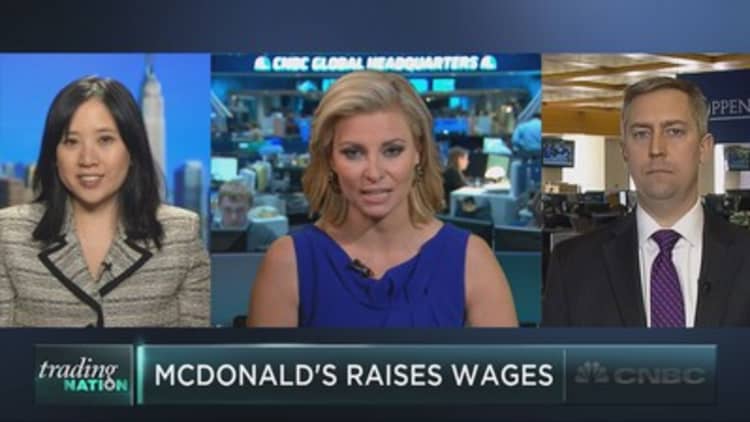
The Golden Arches just joined the wage-hiking trend, increasing the starting wage at the stores it owns (but not at those many more owned by franchisees) to $1 above the local minimum wage. The move follows a similarly splashy wage boost from Walmart, which announced in February that it would raise its minimum hourly pay to $9, and $10 by next February.
The question now is whether these wage hikes will force the Federal Reserve to do a hike of its own, and raise the federal funds rate. That's the key short-term lending rate that has been seen as helping stock returns over the past few years, as it makes owning stock a more attractive proposition than hoarding cash or holding onto bonds.
The Fed has kept that key rate low because it believes that basement-level rates help the jobs market without spurring undue inflation. But as wages gain ground, the risk-reward calculus may change.
It's not just anecdotal evidence suggesting that wages are rising, either. Buried in the very weak March jobs report was the fact that average hourly earnings rose 7 cents in March, to $24.86. It is worth noting that due to a tick lower in hours worked, average weekly earnings stayed flat.
But with wages rising 2.1 percent year over year, not only outpacing inflation but also running hotter than the Fed's overall inflation target, the central bank may pay more attention to anecdotal evidence like that presented by McDonald's and Walmart.
The question is "whether other companies follow suit. And right now we haven't seen any evidence of that. But if they do, and you do see the wage increases being passed onto consumer prices, then the Fed will be worried," said Kathy Lien of BK Asset Management.
Still, she doesn't think the specific move by McDonald's will force the Fed's hand.
Read MoreMcDonald's to raise pay as franchises may feel new pressure
Economists are downplaying the news as well.
While ceding that "Anecdotal evidence of stronger wage growth continues to build," Bank of America Merrill Lynch economist Ethan Harris emphasizes that because it only affects the company stores and not those owned by franchisees, "the direct impact on average wages is low."
Still, if nothing else, it may serve to convince the Federal Reserve that the labor market is not as soft as Friday's jobs report may suggest.
Correction: This story has been updated to reflect that March average hourly earnings were $24.86.
Want to be part of the Trading Nation? If you'd like to call into our live Monday show, email your name, number, and question to TradingNation@cnbc.com.






